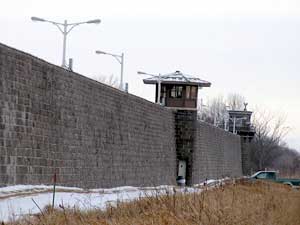Audio
Photos
More from MPR
| ||||||||||||||||||||||||||||||||||||
May 23, 2005
 |
| More sex offenders could spend more time in prison under the public safety bill passed by the Legislature Monday. (MPR file photo) |
St. Paul, Minn. — Both the House and Senate passed a public safety bill that includes stiffer sentences for violent sex crimes. State lawmakers have been pushing for longer prison terms for sex offenders since North Dakota college student Dru Sjodin was killed in November 2003, allegeldy by a convicted sex offender.
Rep. Kurt Zellers, R-Maple Grove, says state lawmakers are sending a message to anyone who commits a violent sex crime in Minnesota.
"If you do this in our state, here are the consequences. We will slam the door on you and we will slam it hard. It will not open again, you will not get out. You will go to prison for the rest of your life."
Those who commit certain other sex crimes would also receive open-ended life sentences. The bill also requires life without parole for those convicted of premeditated first degree murder.
Those who make methamphetamine around children would also spend a longer period of time behind bars. The Corrections Department says the tougher penalties will require an extra 166 prison beds over the next two years.
But Rep. Tom Rukavina, DFL-Virginia, says those projections don't capture the full cost of the new life sentences. Rukavina says lawmakers need to find a way to pay for the state's rapidly growing prison population.
"You can't keep putting people in jail without the money there to keep them in jail," says Rukavina.
The bill would also require retailers to place cold and allergy medicine containing pseudoephedrine behind the pharmacy counter. Customers would be required to sign a log book, and be limited in the amount they could buy at one time and over a 30-day period.
State lawmakers rejected a proposal to require customers to present a prescription to buy pseudoephedrine products. Rep. Jeff Johnson, R-Plymouth, says the provision would have cost the state too much money if enacted.
"Now folks who are on Medical Assistance would have to go see their doctor in order to get Sudafed every time they had a cold. There was a risk of significant cost there, and that was pretty convincing to me that that wasn't the right step," says Johnson.
Several other controversial items were also taken out of the bill. Level 3 sex offenders who live in the community would not be issued special license plates or driver's licenses notifying the public of their past crimes.
The Senate passed the bill on a 62-4 vote. Sen. Jane Ranum, DFL-Minneapolis, says she's also pleased that there's more money for parole officers and crime victims services.
"You can't have a truly effective criminal justice system unless all the parts of the system have the tools and resources they need to do their jobs," says Ranum.
Before adjournment Monday night, state lawmakers were also expected to pass a $470 million bill that would fund state government agencies. The bill includes significant cuts to the Legislature and to state agencies, but it would increase funding for veterans and veteran organizations.
Rep. Marty Seifert, R-Marshall, says he's pleased the House and Senate finished their work on the bill.
"When you look at all of the stalemating going on at the Legislature, it's an important bill to get done because Revenue and Finance shut down on July 1 if this bill doesn't pass. It shows that we can cooperate and get things done in a good manner," says Seifert.
Several lawmakers expressed concern that the state government finance bill did not include more pay for state employees. Senate DFLers wanted to set aside a 1 percent salary increase for state employees.
That issue will be addressed in the special session. That worries Rep. Bill Hilty, DFL-Finlayson, who says state workers haven't received a raise in three years.
"Morale of state employees is at an all-time low, and we can't continue to ask people to do the work that they do without a pay increase," says Hilty.
Hilty says it's possible that state workers can still receive a raise even if lawmakers don't set aside any money. He says the Legislature can provide more money for state employees once they agree on a contract with the Pawlenty administration.






